![]()
![]() It is the first day of January of 2016. Yes, the New Year has begun. We are all a bit older, wiser, and sadly, a little closer to death. Naturally, this is the perfect time to look back at some of the news stories that made headlines in Pakistan and across the world.
It is the first day of January of 2016. Yes, the New Year has begun. We are all a bit older, wiser, and sadly, a little closer to death. Naturally, this is the perfect time to look back at some of the news stories that made headlines in Pakistan and across the world.
![]() Girls at Dhabas:
For Pakistanis worn down by the taxing life of the big city, nothing quite reignites the brain cells like a good cup of doodh pati (tea). Sold at dhabas (roadside restaurants), these delicious cups of hot tea brewed in milk are consumed by the masses at every corner of the country with great regularity.
[caption id="" align="alignnone" width="600"]
Girls at Dhabas:
For Pakistanis worn down by the taxing life of the big city, nothing quite reignites the brain cells like a good cup of doodh pati (tea). Sold at dhabas (roadside restaurants), these delicious cups of hot tea brewed in milk are consumed by the masses at every corner of the country with great regularity.
[caption id="" align="alignnone" width="600"]![]() Photo: Indiegogo[/caption]
While women aren’t barred from dhabas, they aren’t as regular a fixture at these small tea shops as men due to various social norms. When regular tea consuming friends Sadia Khatri, Natasha Ansari, Rabeea Arif and Najia Khan, decided to confront the gender disparity, they started the hashtag #girlsatdhaba.
Little did they know that their movement would take on a life of its own.
Today, the initiative has thousands of fans on Facebook, Twitter, Instagram, and Tumblr. #girlsatdhaba has been covered by news websites such as The Express Tribune and Buzzfeed, and has even caught on in the neighbouring India.
This, of course, is fantastic. The patriarchal mindset of Pakistani society will start changing when women reclaim their social spaces. Our men need to become accustomed to seeing single or groups of women in public settings without male escorts. I, for one look, forward to #girlsonscooters #girlsinjeans and #girlsdrivingtaxis as the next Pakistani social movements.
Pakistan demands return of Koh-i-Noor diamond from Britain:
[caption id="" align="alignnone" width="640"]
Photo: Indiegogo[/caption]
While women aren’t barred from dhabas, they aren’t as regular a fixture at these small tea shops as men due to various social norms. When regular tea consuming friends Sadia Khatri, Natasha Ansari, Rabeea Arif and Najia Khan, decided to confront the gender disparity, they started the hashtag #girlsatdhaba.
Little did they know that their movement would take on a life of its own.
Today, the initiative has thousands of fans on Facebook, Twitter, Instagram, and Tumblr. #girlsatdhaba has been covered by news websites such as The Express Tribune and Buzzfeed, and has even caught on in the neighbouring India.
This, of course, is fantastic. The patriarchal mindset of Pakistani society will start changing when women reclaim their social spaces. Our men need to become accustomed to seeing single or groups of women in public settings without male escorts. I, for one look, forward to #girlsonscooters #girlsinjeans and #girlsdrivingtaxis as the next Pakistani social movements.
Pakistan demands return of Koh-i-Noor diamond from Britain:
[caption id="" align="alignnone" width="640"]![]() Photo: Reuters[/caption]
After some Indians sued England’s Queen Elizabeth for the return of the Koh-i- Noor diamond, many Pakistanis scoffed,
Photo: Reuters[/caption]
After some Indians sued England’s Queen Elizabeth for the return of the Koh-i- Noor diamond, many Pakistanis scoffed,
“You’re kidding right? Ranjit Singh’s capital was Lahore. His empire was in Pakistan. He was born in a Pakistani city. His granddaughter died a Pakistani. OK so it was India at the time… but still!”
So naturally, we too decided to file a
court petition for the return of the 105-carat diamond.
Personally, I think Pakistan is better off examining its treatment of various
minorities, relics, and
heritage sites than chasing the diamond. Our stifling lack of multiculturalism won’t be fixed by the return of Koh-i-Noor. Also, I’d hate to see the diamond end up in the government’s hands, where 10% of it disappears into the pocket of some politician.
Pakistani man marries two girls on the same day:
The bizarre thing about a
man marrying two cousins on the same day in a ceremony where he was embracing both of them wasn’t in the act itself, as much it was in how he was hailed as a champion for doing so.
The story was picked up by various Pakistani TV channels, many of whom openly cheered the man for his actions. The groom, in his late 20s, was lauded for saving these two women from the process of finding husbands before they were past their shelf lives.
![]()
Oh those poor unmarried girls. Thank goodness this guy came along!
There are so many things wrong with this story. First of all, would the opposite have been okay? Would a woman have been applauded for saving two men from bachelorhood? Also, who says
unmarried girls need saving? Why must they be married by a certain date, if at all? Neither gender comes with an expiry date.
Woman from Sialkot gives birth to quintuplets:
[caption id="" align="alignnone" width="600"]
![]()
Photo: Dunya News[/caption]
In lighter news, a woman from Sialkot
gave birth to three girls and two boys at a Military Hospital. Certainly, the process must have been tough for the mother, and will continue to be trying as her children grow older. What’s more, the cost of raising these children is going to be very high, and one can only hope the family has been given some aid from the government to help in the journey.
But look at them! They are adorable!
https://www.youtube.com/watch?v=_h3N8xF7tQ4
Pakistani men are the third sexiest:
When a dating website ranked Pakistani men as the third sexiest in the world, local social media went into frenzy. The story was shared countless times across Facebook by Pakistani men who gloated and said,
“See… see?”
On the other hand, many Pakistani women were taken aback. Some even said,
“What? Have they even been to Karachi?”
Karachi men were immediately put off by these passive aggressive comments. We have some handsome men, some of whom are currently living in self-exile in the United Kingdom.
![]()
As it turns out, the entire report was flawed.
Techjuice.pk expands on the issues with the survey:
“In this case, the online dating portal Miss Travel did conduct a survey to collect opinions on ‘the Sexiest Nationalities’, but they were based on one sample male from different countries as an example. And the only contribution from Pakistan to that list was Zayn Malik, a 22-year-old born and bred in Bradford, United Kingdom, and whose remotest relation to Pakistan is that his father hails from this country.
[caption id="" align="alignnone" width="625"]
![]()
Photo: ZAP2IT[/caption]
But did the article-churning, social media sharing machines care? Nope.
Every single post that has been circulated ever since this story went viral has pictures of Pakistani celebrities like Hamza Ali Abbasi, Fawad Khan, Ali Zafar, and Imran Khan plastered all over the place. Were they even a part of this survey? Did any of the participating 66,309 American females ever see even so much as a photograph of these celebrities before they hit Zayn Malik’s name on that opinion poll questionnaire? Highly unlikely.”
![]() Please play with us India:
Please play with us India:
In 2015, the Pakistan Cricket Board (PCB) somewhat shamelessly chased its Indian counterpart to agree to a series. While the Indians remained impassive, the PCB released strange contradictory statements almost on a weekly basis regarding the series, hilariously giving their neighbours deadlines that the Board of Control for Cricket in India (BCCI) clearly didn’t care about.
[caption id="" align="alignnone" width="600"]
![]()
PCB Chairman Shaharyar Khan. Photo: AFP[/caption]
Ultimately, after months of trying to woo them, the
PCB finally gave up, after losing all self-respect in the eyes of cricket fans across the world.
Although a Pakistan-India series is obviously lucrative, it is a pity that the PCB came across as a would-be lover running desperate circles around a crush who wouldn’t give them the time of day.
![]() Paris and The Refugee Crisis:
Paris and The Refugee Crisis:
[caption id="" align="alignnone" width="600"]
![]()
Rescuers workers evacuate victims near the Bataclan concert hall in central Paris, on November 13, 2015. A number of people were killed and others injured in a series of gun attacks across Paris, as well as explosions outside the national stadium where France was hosting Germany. Photo: AFP[/caption]
This last year was an alarming period where extremism made headlines with great frequency. The
attacks in Paris shocked the world, where
ISIS conducted one of the deadliest attacks in the history of France. While there was
backlash against refugees, it is heartening to see that some nations continued in their overwhelming support for those displaced from their nations. Recently, the
Trudeau government welcomed thousands into Canada. Meanwhile,
Germany is said to have helped over a million refugees.
The price of safety:
[caption id="" align="alignnone" width="600"]
![]()
Photo: AFP[/caption]
The potential for terrorism has certainly affected the way we have lived our lives in 2015. Precautionary measures have affected both public transportation and air travel. Here in Pakistan, we too have had to deal with the inconvenience of restricted freedoms. This past year, more draconian measures were introduced in parliament designed to curb internet privacy in the name of protection. Most recently,
Blackberry threatened to pull out of Pakistan after the government demanded unfettered access to their encryption Enterprise Services.
[caption id="" align="alignnone" width="600"]
![]()
Photo: Mohammad Noman / Express[/caption]
Even New Year’s Day was a sombre affair in Karachi. Roads were shut down and
security was so tight that many Karachiites ushered in 2015 by sitting in their apartments and listening to the celebratory gunfire.
![]()
It was another bad year to be an Ahmadi in Pakistan. In Jhelum, Punjab, a factory owned by the Ahmadiyya community was
burned down by an angry mob. Although many escaped the factory complex, which contains a residential section, a number were still inside when the horror began. To make matters worse, an
Ahmadi place of worship was also torched. Through no fault of their own, these Pakistanis lost their homes and peace of mind thanks to local clerics who had riled up their worshipers with fiery speeches.
[caption id="" align="alignnone" width="640"]
![]()
Photo: Reuters[/caption]
Not a few months later, mobile shop owners at Hafeez Centre
hung up signs with derogatory language against Ahmadias. After these men were arrested, and the signs taken down in a commendable move by the Punjab government, a protest began against both the police and the minority group in question.
Sadly, it doesn’t seem like 2016 will be any different in terms of how tolerant our general public is of those who different beliefs than them. But there is light at the end of the tunnel. It seems like the Punjab government is serious about turning things around. Taking action at Hafeez Centre may have been a tiny step, but in context of this nation’s history, it was a giant leap.
![]()
The Kingdom has made headlines in 2015 for a variety of undesirable reasons. One of the most curious news stories was regarding Saudi Grand Mufti Sheikh Abdul Aziz, who has previously reportedly issued a fatwa that men should eat their wives when hungry. He
later denied this after the outrage and said that all churches in the Gulf should be destroyed, and
blamed Israel for ISIS.
[caption id="" align="alignnone" width="600"]
![]()
Saudi Grand Mufti Sheikh Abdul Aziz. Photo: AFP[/caption]
Look Mr Grand Mufti, we realise that Israel’s treatment of Palestinians has been deplorable, but let’s give credit where it’s due:
1. The
second highest number of foreign fighters killing, pillaging, and raping for ISIS are from Saudi Arabia, not Israel.
2. ISIS follows a radical version of Islam called
Wahhabism which is ‘rooted and encouraged’ in Saudi Arabia, not Israel.
3. According to
Wikileaks, Saudi Arabia, not Israel, has spread the cancerous Wahhabism to countries like Pakistan, infecting people with intolerance against “Christians, Jews, Shiites, Sufis, Sunni Muslims who do not follow Wahhabi doctrine, Hindus, atheists and others”, as reported by
Freedom House.
4. Ensaf Haidar, the wife of the imprisoned Saudi blogger Raif Badawi, said the
Saudi government behaves like Daesh (ISIS). Note, she didn’t say Israel.
5. Wikileaks mentions
Saudi Arabia as an ATM for terror groups such as Taliban, Al Qaeda, Lashkar-e-Taiba, as well as the unrest in Syria and Iraq. No sign of Israel in the picture.
So let’s not try to pass off the blame for this mad dog on to someone else.
![]() Pakistan:
Pakistan:
This was
a promising year for Pakistani cinema. We were treated to watchable films such as
Shah,
Manto,
3 Bahadur, and
Moor. While none of these films were perfect, they showed that our local film industry is on the right track. Incidentally, none of these cinematic releases made it to the list of top five highest grossing Pakistani films, even though they had respectable takes.
Surprisingly, the
highest grossing local film of 2015 was the trashy
Jawani Phir Nahi Ani, which
just goes to show:
sex sells.
![]() Star Wars:
Star Wars:
![]()
Sure,
The Force Awakens wasn’t perfect. For one, it closely followed the blueprint of
A New Hope. For the other, it carried a couple of plot holes larger than Jabba the Hut’s head. But it was the most entertaining film of the year and revived a franchise that had been nearly killed by the prequel trilogy. Perhaps it is because I am a diehard
Star Wars fan, but episode seven was my favourite film of the year. To date it has broken many
Box Office records, and could even challenge the gargantuan worldwide gross of
James Cameron’s Avatar.
Thanks for reading everyone. May the Force be with you in 2016.





 If their sexist ‘humour’ wasn’t nauseating enough, their food is named after celebrities such as Sean Penn and Bill Cosby. You know, men who have a record of physically and emotionally abusing women.
Take Sean Penn for example:
Cracked:
If their sexist ‘humour’ wasn’t nauseating enough, their food is named after celebrities such as Sean Penn and Bill Cosby. You know, men who have a record of physically and emotionally abusing women.
Take Sean Penn for example:
Cracked:

 Here, the restaurant tried to feign innocence by resorting to gas-lighting:
Here, the restaurant tried to feign innocence by resorting to gas-lighting:
 If we are expected to believe that ‘Cozbee’ is a made-up name and we are jumping to conclusions, then the owner of this restaurant is pretty bucking cupid.
Then, there is the mysterious fan boy, energetically defending the restaurant in the most bizarre manner possible:
If we are expected to believe that ‘Cozbee’ is a made-up name and we are jumping to conclusions, then the owner of this restaurant is pretty bucking cupid.
Then, there is the mysterious fan boy, energetically defending the restaurant in the most bizarre manner possible:



 On a side note, this is what the above mentioned term means:
On a side note, this is what the above mentioned term means:

 Undoubtedly, some will ask why the aggrieved are protesting so passionately. Sadly, no one would have fired this query had the jokes, instead of being sexist, been racist or anti-religion.
What is it about sexism that finds such casual acceptance? If issues such as racism and bigotry are condemned with little backlash, why does sexism draw apologists out of the woodwork?
Just so that we are clear, as a feminist I am offended by sexist jokes, as a man, I am offended by sexist jokes, but most importantly, as a human being I am offended by sexist jokes.
Offhanded misogyny, carefully packaged in a seemingly acceptable joke, is dangerous because it convinces some of the righteousness of sexism on a subconscious level. Equal rights for men and women can’t be achieved, when those capable of initiating change consume media that convinces them of the superiority of a single gender.
Certainly, I can’t fathom why the owner of this business has decided on such a counterproductive plan. How can hatred of women override all common sense?
As part of an industry that thrives on good-will, naming your food after rapists and abusers is far from a clever way to get attention. Certainly, it makes one wonder what ingredients Table No. 5 are using in their food.
I would urge readers to call this establishment to let them know that misogyny is unacceptable.
Undoubtedly, some will ask why the aggrieved are protesting so passionately. Sadly, no one would have fired this query had the jokes, instead of being sexist, been racist or anti-religion.
What is it about sexism that finds such casual acceptance? If issues such as racism and bigotry are condemned with little backlash, why does sexism draw apologists out of the woodwork?
Just so that we are clear, as a feminist I am offended by sexist jokes, as a man, I am offended by sexist jokes, but most importantly, as a human being I am offended by sexist jokes.
Offhanded misogyny, carefully packaged in a seemingly acceptable joke, is dangerous because it convinces some of the righteousness of sexism on a subconscious level. Equal rights for men and women can’t be achieved, when those capable of initiating change consume media that convinces them of the superiority of a single gender.
Certainly, I can’t fathom why the owner of this business has decided on such a counterproductive plan. How can hatred of women override all common sense?
As part of an industry that thrives on good-will, naming your food after rapists and abusers is far from a clever way to get attention. Certainly, it makes one wonder what ingredients Table No. 5 are using in their food.
I would urge readers to call this establishment to let them know that misogyny is unacceptable.
 But please, keep it clean. Don’t drop to their level of distaste.
But please, keep it clean. Don’t drop to their level of distaste.





 In response, most were sympathetic:
In response, most were sympathetic:
 Not surprisingly, some were absurdly judgmental:
Not surprisingly, some were absurdly judgmental:
 Others explained how upon complaining after facing a similar predicament, they were labelled as ‘yahoodis’ (Jews) by the imam:
Others explained how upon complaining after facing a similar predicament, they were labelled as ‘yahoodis’ (Jews) by the imam:
 Almost every other person suggested violence:
Almost every other person suggested violence:
 To avoid unpleasantness, a simple solution for worshippers is to park only where there is a legal place to leave a car. By saving yourself a 15-minute walk, you aren’t doing the rest of us any favours. Please don’t inconvenience the rest of us for your convenience.
To avoid unpleasantness, a simple solution for worshippers is to park only where there is a legal place to leave a car. By saving yourself a 15-minute walk, you aren’t doing the rest of us any favours. Please don’t inconvenience the rest of us for your convenience.
 And what about PTI’s brothers on the election trail, JI?
Recently, PTI head honcho, Imran Khan, wrote an
And what about PTI’s brothers on the election trail, JI?
Recently, PTI head honcho, Imran Khan, wrote an  This is the same JI that sought a
This is the same JI that sought a 
 In a nutshell, PTI is willing to create compassion for a dictator, a convicted murderer, convicted war criminals, a fellow party which supports religious extremists, a woman accused of terrorism, and an entire terrorist organisation (immediately after it bombs a
In a nutshell, PTI is willing to create compassion for a dictator, a convicted murderer, convicted war criminals, a fellow party which supports religious extremists, a woman accused of terrorism, and an entire terrorist organisation (immediately after it bombs a 
 Clearly, a growing number of PTI voters are becoming
Clearly, a growing number of PTI voters are becoming 
 Recently, a mob in Jhelum, Punjab,
Recently, a mob in Jhelum, Punjab, 
 PHOTO: AP[/caption]
Recently, Pakistani opener Mohammad Hafeez and World-Cup-winner-turned-pundit Ramiz Raja
PHOTO: AP[/caption]
Recently, Pakistani opener Mohammad Hafeez and World-Cup-winner-turned-pundit Ramiz Raja  PHOTO: AP[/caption]
Here he continues with his wild theory,
PHOTO: AP[/caption]
Here he continues with his wild theory,
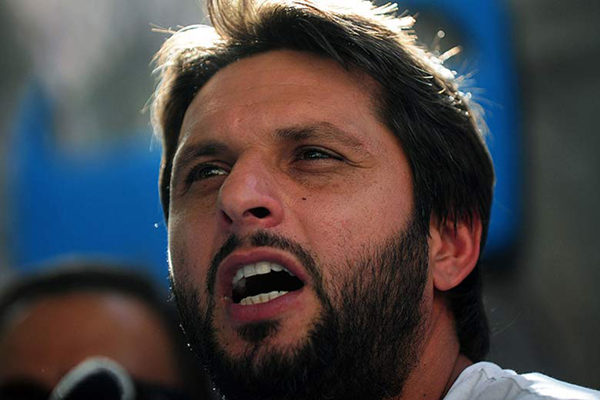 PHOTO: AP[/caption]
Yes, Amir was targeted because he was more vulnerable, and he has served his sentence, but should he be
PHOTO: AP[/caption]
Yes, Amir was targeted because he was more vulnerable, and he has served his sentence, but should he be 

 Photo: Kashif N Chaudhry[/caption]
[caption id="" align="alignnone" width="600"]
Photo: Kashif N Chaudhry[/caption]
[caption id="" align="alignnone" width="600"] Photo: Kashif N Chaudhry[/caption]
[caption id="" align="alignnone" width="600"]
Photo: Kashif N Chaudhry[/caption]
[caption id="" align="alignnone" width="600"] Photo: Mohammad Jibran Nasir – Official[/caption]
Yes, we love a good protest, don’t we?
We gleefully demonstrate against the sentencing of murderer
Photo: Mohammad Jibran Nasir – Official[/caption]
Yes, we love a good protest, don’t we?
We gleefully demonstrate against the sentencing of murderer 
 The detained man has since been released on bail, immediately finding love from our masses.
The detained man has since been released on bail, immediately finding love from our masses.
 Having examined what earns an angry protest in this country, let’s take a look at the incidents left ignored by our demonstrators.
1. Mass child molestation ring uncovered in
Having examined what earns an angry protest in this country, let’s take a look at the incidents left ignored by our demonstrators.
1. Mass child molestation ring uncovered in 
 Photo: Screengrab[/caption]
To see grown men and women wearing childrens’ school uniforms on a day when
Photo: Screengrab[/caption]
To see grown men and women wearing childrens’ school uniforms on a day when  Then, there was Neo TV, snatching the lowest hanging fruit hungrily with both teeth. An interview of a
Then, there was Neo TV, snatching the lowest hanging fruit hungrily with both teeth. An interview of a 
 After Malik uploaded a picture of the food to her Facebook page, the image went viral, leaving PIA red-faced. Here, the airliner contacted the woman asking her if they could compensate her in anyway. When she suggested they give her family free air tickets, the company shared images of their private conversation across their official social media pages in order to malign her character.
After Malik uploaded a picture of the food to her Facebook page, the image went viral, leaving PIA red-faced. Here, the airliner contacted the woman asking her if they could compensate her in anyway. When she suggested they give her family free air tickets, the company shared images of their private conversation across their official social media pages in order to malign her character.
 Imagine that. They asked her how they could compensate her. When she suggested a reasonable option, they used the opportunity to make her seem like a criminal instead of apologising for nearly killing her with food poisoning. This was a
Imagine that. They asked her how they could compensate her. When she suggested a reasonable option, they used the opportunity to make her seem like a criminal instead of apologising for nearly killing her with food poisoning. This was a 

 It is the first day of January of 2016. Yes, the New Year has begun. We are all a bit older, wiser, and sadly, a little closer to death. Naturally, this is the perfect time to look back at some of the news stories that made headlines in Pakistan and across the world.
It is the first day of January of 2016. Yes, the New Year has begun. We are all a bit older, wiser, and sadly, a little closer to death. Naturally, this is the perfect time to look back at some of the news stories that made headlines in Pakistan and across the world.
 Girls at Dhabas:
For Pakistanis worn down by the taxing life of the big city, nothing quite reignites the brain cells like a good cup of doodh pati (tea). Sold at dhabas (roadside restaurants), these delicious cups of hot tea brewed in milk are consumed by the masses at every corner of the country with great regularity.
[caption id="" align="alignnone" width="600"]
Girls at Dhabas:
For Pakistanis worn down by the taxing life of the big city, nothing quite reignites the brain cells like a good cup of doodh pati (tea). Sold at dhabas (roadside restaurants), these delicious cups of hot tea brewed in milk are consumed by the masses at every corner of the country with great regularity.
[caption id="" align="alignnone" width="600"]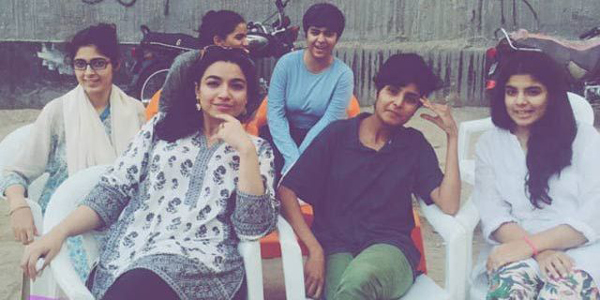 Photo: Indiegogo[/caption]
While women aren’t barred from dhabas, they aren’t as regular a fixture at these small tea shops as men due to various social norms. When regular tea consuming friends Sadia Khatri, Natasha Ansari, Rabeea Arif and Najia Khan, decided to
Photo: Indiegogo[/caption]
While women aren’t barred from dhabas, they aren’t as regular a fixture at these small tea shops as men due to various social norms. When regular tea consuming friends Sadia Khatri, Natasha Ansari, Rabeea Arif and Najia Khan, decided to  Photo: Reuters[/caption]
After some
Photo: Reuters[/caption]
After some  Oh those poor unmarried girls. Thank goodness this guy came along!
There are so many things wrong with this story. First of all, would the opposite have been okay? Would a woman have been applauded for saving two men from bachelorhood? Also, who says
Oh those poor unmarried girls. Thank goodness this guy came along!
There are so many things wrong with this story. First of all, would the opposite have been okay? Would a woman have been applauded for saving two men from bachelorhood? Also, who says  Photo: Dunya News[/caption]
In lighter news, a woman from Sialkot
Photo: Dunya News[/caption]
In lighter news, a woman from Sialkot  As it turns out, the entire report was flawed.
As it turns out, the entire report was flawed.  Photo: ZAP2IT[/caption]
Photo: ZAP2IT[/caption]
 Please play with us India:
In 2015, the Pakistan Cricket Board (PCB) somewhat shamelessly chased its Indian counterpart to agree to a series. While the Indians remained impassive, the PCB released strange contradictory statements almost on a weekly basis regarding the series, hilariously giving their neighbours deadlines that the Board of Control for Cricket in India (BCCI) clearly didn’t care about.
[caption id="" align="alignnone" width="600"]
Please play with us India:
In 2015, the Pakistan Cricket Board (PCB) somewhat shamelessly chased its Indian counterpart to agree to a series. While the Indians remained impassive, the PCB released strange contradictory statements almost on a weekly basis regarding the series, hilariously giving their neighbours deadlines that the Board of Control for Cricket in India (BCCI) clearly didn’t care about.
[caption id="" align="alignnone" width="600"]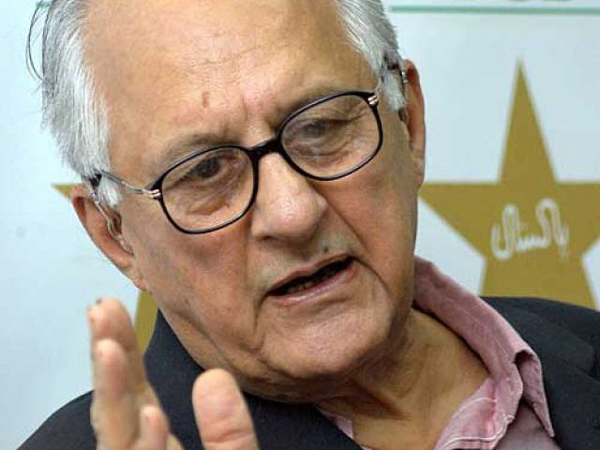 PCB Chairman Shaharyar Khan. Photo: AFP[/caption]
Ultimately, after months of trying to woo them, the
PCB Chairman Shaharyar Khan. Photo: AFP[/caption]
Ultimately, after months of trying to woo them, the  Paris and The Refugee Crisis:
[caption id="" align="alignnone" width="600"]
Paris and The Refugee Crisis:
[caption id="" align="alignnone" width="600"] Rescuers workers evacuate victims near the Bataclan concert hall in central Paris, on November 13, 2015. A number of people were killed and others injured in a series of gun attacks across Paris, as well as explosions outside the national stadium where France was hosting Germany. Photo: AFP[/caption]
This last year was an alarming period where extremism made headlines with great frequency. The
Rescuers workers evacuate victims near the Bataclan concert hall in central Paris, on November 13, 2015. A number of people were killed and others injured in a series of gun attacks across Paris, as well as explosions outside the national stadium where France was hosting Germany. Photo: AFP[/caption]
This last year was an alarming period where extremism made headlines with great frequency. The 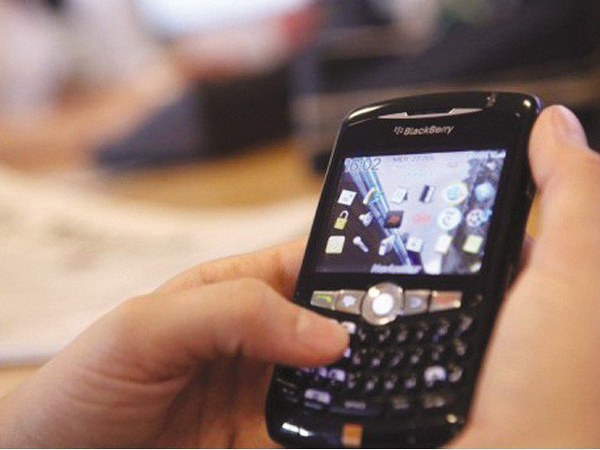 Photo: AFP[/caption]
The potential for terrorism has certainly affected the way we have lived our lives in 2015. Precautionary measures have affected both public transportation and air travel. Here in Pakistan, we too have had to deal with the inconvenience of restricted freedoms. This past year, more draconian measures were introduced in parliament designed to curb internet privacy in the name of protection. Most recently,
Photo: AFP[/caption]
The potential for terrorism has certainly affected the way we have lived our lives in 2015. Precautionary measures have affected both public transportation and air travel. Here in Pakistan, we too have had to deal with the inconvenience of restricted freedoms. This past year, more draconian measures were introduced in parliament designed to curb internet privacy in the name of protection. Most recently, 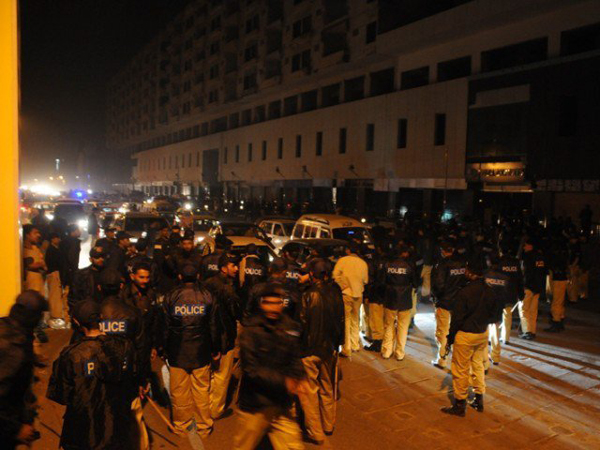 Photo: Mohammad Noman / Express[/caption]
Even New Year’s Day was a sombre affair in Karachi. Roads were shut down and
Photo: Mohammad Noman / Express[/caption]
Even New Year’s Day was a sombre affair in Karachi. Roads were shut down and  It was another bad year to be an Ahmadi in Pakistan. In Jhelum, Punjab, a factory owned by the Ahmadiyya community was
It was another bad year to be an Ahmadi in Pakistan. In Jhelum, Punjab, a factory owned by the Ahmadiyya community was  Photo: Reuters[/caption]
Not a few months later, mobile shop owners at Hafeez Centre
Photo: Reuters[/caption]
Not a few months later, mobile shop owners at Hafeez Centre  The Kingdom has made headlines in 2015 for a variety of undesirable reasons. One of the most curious news stories was regarding Saudi Grand Mufti Sheikh Abdul Aziz, who has previously reportedly issued a fatwa that men should eat their wives when hungry. He
The Kingdom has made headlines in 2015 for a variety of undesirable reasons. One of the most curious news stories was regarding Saudi Grand Mufti Sheikh Abdul Aziz, who has previously reportedly issued a fatwa that men should eat their wives when hungry. He 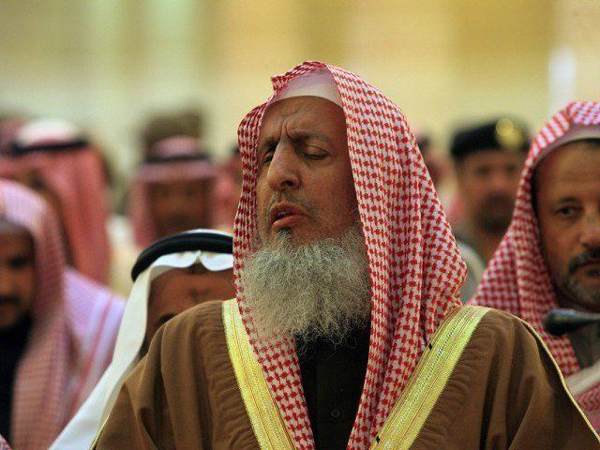 Saudi Grand Mufti Sheikh Abdul Aziz. Photo: AFP[/caption]
Look Mr Grand Mufti, we realise that Israel’s treatment of Palestinians has been deplorable, but let’s give credit where it’s due:
1. The
Saudi Grand Mufti Sheikh Abdul Aziz. Photo: AFP[/caption]
Look Mr Grand Mufti, we realise that Israel’s treatment of Palestinians has been deplorable, but let’s give credit where it’s due:
1. The  Pakistan:
This was
Pakistan:
This was  Star Wars:
Star Wars:
 Sure, The Force Awakens wasn’t perfect. For one, it closely followed the blueprint of A New Hope. For the other, it carried a couple of plot holes larger than Jabba the Hut’s head. But it was the most entertaining film of the year and revived a franchise that had been nearly killed by the prequel trilogy. Perhaps it is because I am a diehard
Sure, The Force Awakens wasn’t perfect. For one, it closely followed the blueprint of A New Hope. For the other, it carried a couple of plot holes larger than Jabba the Hut’s head. But it was the most entertaining film of the year and revived a franchise that had been nearly killed by the prequel trilogy. Perhaps it is because I am a diehard 


 To the Pakistanis and Indians reading this, let’s get something straight –
To the Pakistanis and Indians reading this, let’s get something straight – 
 Photo: Screenshot[/caption]
[caption id="" align="alignnone" width="480"]
Photo: Screenshot[/caption]
[caption id="" align="alignnone" width="480"] Photo: Screenshot[/caption]
[caption id="" align="alignnone" width="484"]
Photo: Screenshot[/caption]
[caption id="" align="alignnone" width="484"] Photo: Screenshot[/caption]
[caption id="" align="alignnone" width="470"]
Photo: Screenshot[/caption]
[caption id="" align="alignnone" width="470"] Photo: Screenshot[/caption]
There is also the case of a relative of mine. While volunteering during a sporting event, she was sexually assaulted by a mob in Pakistan right outside of a cricket stadium. Seen carrying flags of both India and Pakistan, perhaps her attackers used the Indian flag as some sort of depraved validation.
[caption id="" align="alignnone" width="501"]
Photo: Screenshot[/caption]
There is also the case of a relative of mine. While volunteering during a sporting event, she was sexually assaulted by a mob in Pakistan right outside of a cricket stadium. Seen carrying flags of both India and Pakistan, perhaps her attackers used the Indian flag as some sort of depraved validation.
[caption id="" align="alignnone" width="501"]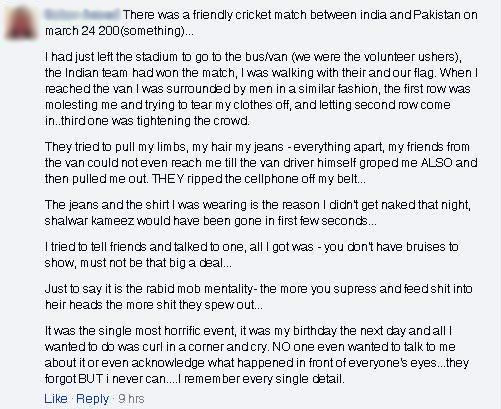 Photo: Screenshot[/caption]
On Twitter, some have taken to describing this as a Muslim tradition, which isn’t true, as Islam doesn’t condone such a thing. But there is no denying that it is taking place at the hands of those of Muslim origin. Of course, the common denominator here isn’t any religion, but men who originate from misogynist nations where women aren’t respected as equals in society, and are objectified as things to derive use from.
https://twitter.com/AliBambii/status/687559426480422912
https://twitter.com/LindaSuhler/status/687510404881235969
https://twitter.com/Ann_Tagonist_/status/686587128461930498
Photo: Screenshot[/caption]
On Twitter, some have taken to describing this as a Muslim tradition, which isn’t true, as Islam doesn’t condone such a thing. But there is no denying that it is taking place at the hands of those of Muslim origin. Of course, the common denominator here isn’t any religion, but men who originate from misogynist nations where women aren’t respected as equals in society, and are objectified as things to derive use from.
https://twitter.com/AliBambii/status/687559426480422912
https://twitter.com/LindaSuhler/status/687510404881235969
https://twitter.com/Ann_Tagonist_/status/686587128461930498

 [poll id="401"]
[poll id="401"]